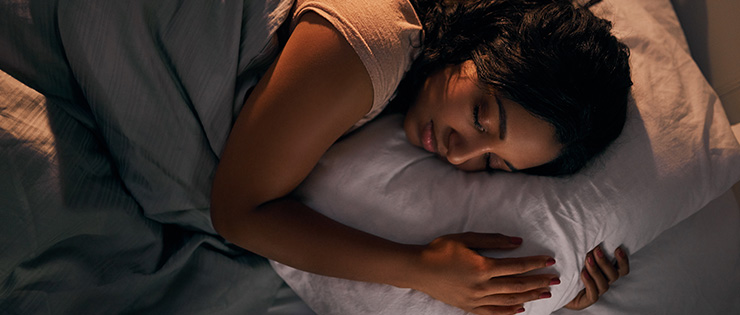
Poor sleep can have a negative impact on mental health. We know, for instance, that mothers of infants with sleep issues are at higher risk of post-natal depression. Inadequate or poor sleep can have other negative health consequences such an increased risk of heart disease and high blood pressure. The immune system also functions better if we get enough sleep (most people need 7-9 hours per night) – supporting immune health is particularly important right now with influenza season and the COVID-19 pandemic facing us.
High-stress levels, which many of us are experiencing right now, can easily affect sleep quality – I know when I'm stressed, or worried sleep is harder to come by; I can lie in bed ruminating on whatever is worrying me at the time. I'm not alone – my patients will often share that they have trouble either falling asleep or with frequent waking in the night due to worry. In anxiety and depression sleep can be significantly affected either with trouble falling asleep or staying asleep – this is something I commonly help my patients with because I know that improving sleep quality can significantly help the underlying mood disorder.
Sleep hygiene is all about getting the body and brain ready for sleep – I write this sleep hygiene script several times a week in general practice and I implement it myself often. Here are some tips – if you're struggling right now you may want to give these are a shot.
Avoid caffeine after 2 PM – caffeine stimulates the brain so avoiding intake in the afternoon can help the brain relax at night
Try and get some form of exercise in the daytime, ideally in natural sunlight
Getting sunlight exposure can help regulate circadian rhythms – the brain gets used to light in the day and when it is dark at night learns to wind down. Exercise can help with stress and anxiety management as well, so I frequently prescribe a walk/swim or cycle to my patients. At the moment in Australia, despite the COVID-19 outbreak, we're able to exercise outdoors as long as we're not in a group - a walk or cycle is still possible.
Avoid any screen exposure in the 1 hour before bed – this includes phones, TV, computers
This is a tricky one for lots of my patients. When I write this one down, I’m often met with a “are you serious?” or a loud sigh like I’m asking for the world. I get it – we're heavily reliant and entwined with our devices. Many will admit they like to scroll through social media feeds (or news feeds right now!) to relax before bed – I understand but it isn’t great for the brain and there are other, better, ways to wind down. Blue light exposure blocks the brain’s ability to generate melatonin – this is the hormone that regulates sleep! No blue light means hopefully more melatonin in the brain and a better night’s sleep!
Try and keep to a regular bedtime and wake uptime
Commit to a regular wind-down ritual 1 hour before bed
This is all about training the brain to prepare for sleep. If you're struggling, try implementing a ritual in the 1 hour before bed (maybe a warm bath, reading in dim light or a warm shower then some colouring or crosswords) and stick to it. For my patients struggling with sleep issues, I ask them to become a toddler with a very set routine as it helps the body and brain prepare for sleep!
Do not clock watch – if you're struggling with sleep remove the clock in the room and stop looking at it constantly
Often patients admit to constantly check the time if they cannot sleep, panicking as the minutes and hours tick by. The panic makes it harder for the brain to relax and for sleep to come! Get rid of the clocks altogether – and if you need an alarm, place it by the door – it will still go off, but you won’t see the minutes ticking by.
If you stick to some or all of these sleep tips – you might just find yourself having some better-quality sleep! These things don’t work immediately- you need to stick with it and train the brain but if you persist, you’ll likely see some benefit. Good luck, stay safe and #stayhome.